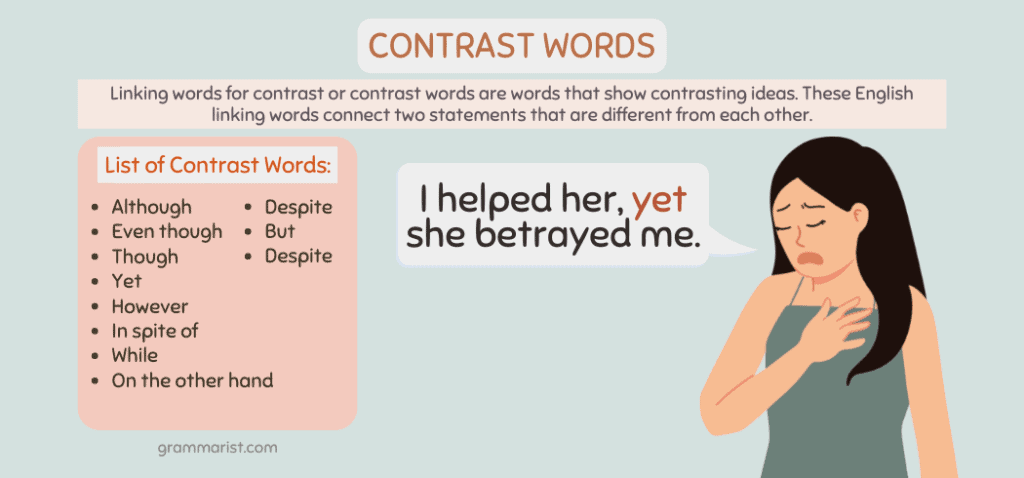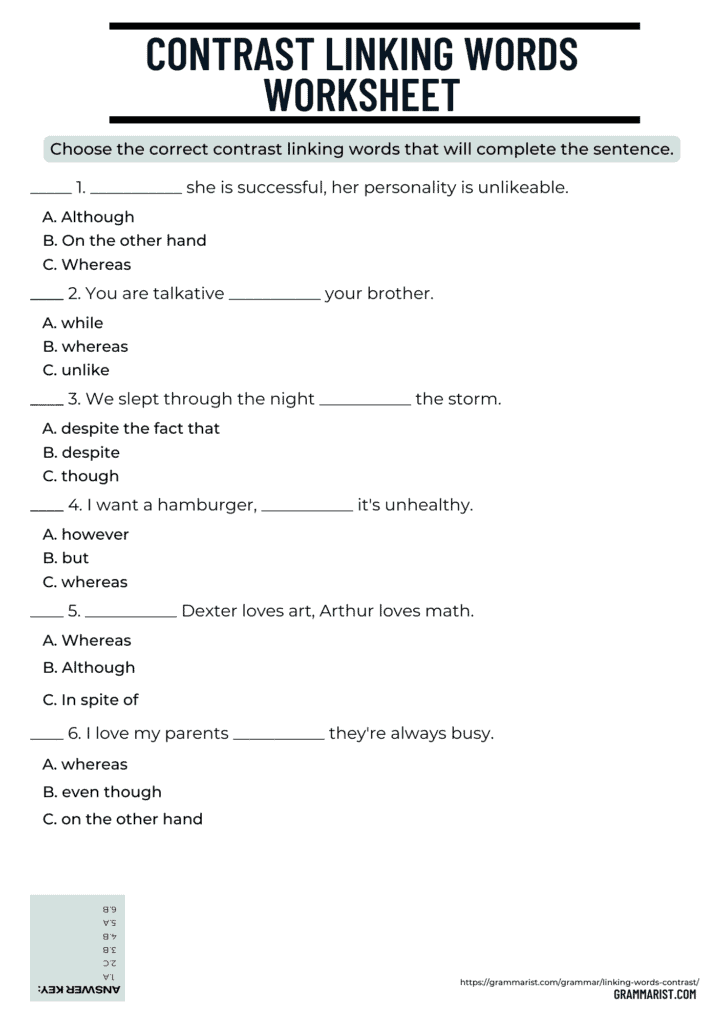Many words connect sentences, clauses, and phrases. But only contrast linking words can express two different ideas. The previous sentence uses the linking word of contrast but two connect it with the first sentence.
Learn the different linking words of contrast in the article and how to use them in sentences. I’ll show you how to position them in sentences and whether to use a comma.
What Are Contrast Words?
Linking words for contrast or contrast words are words that show contrasting ideas. These English linking words connect two statements that are different from each other. For instance, one may be a positive idea, while another is a negative idea.
Here’s a list of contrast words in English.
- Although
- Even though
- Though
- Yet
- However
- Despite
- But
- Despite
- In spite of
- While
- On the other hand
How to Use Contrast Words in a Sentence
Let’s look at the different contrast words and how to use them in sentences.
But/However
However is a sentence starter that shows a contrast between two separate sentences. Place the contrast word at the start of the second sentence, the end, and after the subject. Below are some examples of sentences.
- I love this city. However, the roads are too narrow.
- I love this city. The roads, however, are too narrow.
- I love this city. The roads are narrow, however.
But is more informal than however. Don’t put a comma after it; instead, put a comma before it when it’s used to connect two independent clauses. For example:
- I love this city. But the words are too narrow.
- I love this city, but the roads are too narrow.
Although/Even Though
While however doesn’t connect two clauses, we use although and even though at the beginning of a complete sentence with subject and verb. You can also use them in the middle of a sentence. Here are some examples.
- Although the book was long, I enjoyed reading it the entire weekend.
- I enjoyed reading the book the entire weekend, although it was long.
Though
Though is a looking word found between two phrases. It means despite this or but in the English language. For example:
- I feel down today. I’m still attending the event, though.
- She will be my professor this semester, though I don’t know which subject.
Yet
Use the linker yet when expressing an idea that is surprising because it contradicts what has been mentioned earlier. For example:
- I helped her, yet she betrayed me.
- He’s already 94 years old, yet somehow, he is still fit and healthy.
Despite/In Spite Of
These linking words of contrast are used to contrast ideas. We can also place a noun phrase or an -ing form of the verb after them. For example:
- Despite her suggestions, Mike still played by his own rules.
- In spite of being the top artist in the country, she still feels lonely.
Despite the Fact That/In Spite of the Fact That
Statements like despite the fact that and in spite of the fact that are similar to despite and in spite. But these phrases have a subject and verb after them. For example:
- I enjoyed the party despite the fact that we arrived late.
- He was grateful in spite of the fact that he lost the competition.
While/Whereas/Unlike
While, whereas, and unlike show two things that differ. Use whereas and while with two complete clauses and unlike with a noun. Consider these sentences.
- Joan is happy, while John is excited.
- Whereas Kat looks excited in this photo, Sheila seems upset.
- Unlike Michael, Miguel excels in performing arts.
On the Other Hand
The contrast linking word on the other hand compares two different ways, facts, or ideas of the same situation. Here are some examples.
- On one hand, I want to be an engineer. But on the other hand, I also like my current education degree.
- I enjoy jazz music, but on the other hand, my friend loves rock music.
Practice Using Contrast Linking Words
Contrast linking words join contradicting ideas, whether they’re clauses, sentences, or phrases. These words may have similar uses but different meanings and placements in sentences.
Some contrast words like although and however can be at the beginning of a sentence. Meanwhile, on the other hand, although, and other words can be in the middle of a sentence.
While, whereas, on the one hand, on the other hand, etc. 
In this English lesson you will learn how we use contrast linking words like while, whereas, on the one hand, on the other hand, by contrast and in contrast.
We use these contrast linking words to contrast two facts or ideas but not to contradict.
Let’s have a look how we use each of the linking words.
While/whereas
These two are used simultaneously and you can substitue one for the other.
- My friends like to party, while/whereas I prefer to go to quiet places.
- While/whereas New Zealand has a small population, Australia’s is a lot bigger.
- I like to holiday in the mountains, while/whereas my wife likes to go to the beach.
As you can see, while/whereas can either begin a sentence, or start the second clause. When it starts the second clause it can be substituted by ‘but‘.
- My Mates love to party but I prefer to go to quiet places.
Be careful with ‘while’ because it can also mean ‘during‘.
- I went to the shops while my children were at school.
On the one hand, on the other hand
These linking phrases can be used together as in the following example:
- On the one hand I’d like to quit my job and travel full-time. On the other hand I realise that I must be resonsible and keep my job.
Or, you can use on the other hand alone.
- I’d like to earn more money. On the other hand, I don’t want too much responsibility.
- I like rock music. My wife, on the other hand, likes pop.
By contrast, in contrast
Like while and whereas, by contrast and in contrast can also be used simultaneously.
Have a look at how we use them.
- Bank shares continue to underperform. Tech stocks, by contrast, show no signs of slowing their growth.
- John had a terrible childhood. His wife, in contrast, could not have had a happier one.
There you go. You know no how to use these contrast linking words. Now you will speak and write English even better.
You can study another one of my lessons here.
I also have interactive lessons on curious.com.
Please share the lesson with your friends.
Want to help me make more English video lessons? Buy me breakfast.
Cheers!
Reader Interactions
The phrase «on the other hand» is extremely common and overused in both writing and speech. However, incorporating the phrase into sentences could be a bit tricky as there are different ways of doing it. There are even various replacement phrases/words for it, which further adds to the confusion.
To correctly use the phrase «on the other hand», make sure it introduces a point that is in contrast or opposes what’s being said earlier. Also, you may use it in combination with the phrase «on the one hand» to explicitly communicate the contradiction in the sentences or viewpoints.
Keep reading to learn more about the phrase, how it’s used in a variety of writing situations, review a long list of sentences incorporating the phrase, etc.
«On the Other Hand» – Definition
The phrase «on the other hand» introduces a contrasting point in writing or speech. The phrase is a conjunctive adverb, or an adverb connecting two ideas. It’s used to make a reader view a topic from a different perspective. In other words, the phrase is used to present opposing points of view or ideas in subsequence.
As far as the usage of the term «hand» goes, it basically draws on the basic idea of providing someone an option in one’s right hand and another, completely different choice in the left hand.
The phrase «on the other hand» is used when discussing an event, action, situation, etc.
- Marcus is extremely talented. He, on the other hand, is very lazy too.
- I do not like Korean TV shows a great deal. Korean movies, on the other hand, are quite interesting.
The phrase can be used either at the start of a sentence or after a couple of words (usually a noun) into the sentence. For example:
- Daniel, on the other hand, is friends with Karen.
- On the other hand, Daniel is friends with Karen.
Needless to mention, when not placed at the beginning of a sentence, «on the other hand» should be flanked by commas on both its sides.
Using it with «On the One Hand»
Though not extremely common, the phrase «on the one hand» could precede «on the other hand». The two phrases are typically employed to showcase a couple of contradicting viewpoints a lot more effectively or explicitly.
The reason why «on the one hand» is not very commonly used in writing because the meaning is often quite implicit or most English speakers have no problem understanding the «first hand» without it being made obvious. It has, therefore, become common practice to incorporate «on the other hand» into various sentences and contexts as a standalone phrase.
For example:
- On the one hand, I want to eat out. On the other hand, I am looking to eat healthily.
- I want to eat out. On the other hand, I am looking to eat healthily.
The second sentence above doesn’t use the phrase «on the one hand». It, however, still manages to get the point across without causing confusion or doubt in the reader’s mind.
By adding «one hand» into your writing, however, you are making things a tad interesting for your readers, or they know beforehand a different and fresh piece of information is imminent.
Also, if you use «on the one hand» in your texts, you could get away with not writing «on the other hand» in its entirety. You could just write «on the other», for instance, and still manage to not confuse the reader. For example:
- On the one hand, she would love to have children, but on the other, she is not too keen on giving up her freedom.
Because the first part of the sentence already had the word «hand» in it, the need to repeat the word in the same sentence doesn’t arise.
If, however, you are not incorporating the phrase «on the one hand» into your sentences, you’ll have to write «on the other hand» without cuts. For instance, the usage of «on the other» in the following sentence is incorrect:
- She would love to have children. On the other, she is not too keen on giving up her freedom.
Also, if you do end up using both the phrases as a pair in your texts, try to keep the two as close to each other as possible. This would help the reader easily discern the relationship between the two. The usage of the phrases could be in a single sentence or two sentences, or in successive paragraphs. If there are multiple pages or paragraphs between them, the connection could be difficult to spot.
Is «On the Other Hand» Formal English?
The phrase «on the other hand» is standard English and can be used in a variety of scenarios. It could be used in both casual conversations, and also business and academic writing or conversations. The phrase appears in books, novels, critiques, poems, and essays.
However, some may consider the phrase informal. You should, therefore, look to avoid using it in formal writing whenever possible, including in business documents and academic papers. Other words or phrases – such as «conversely», «by contrast», etc. – could be used as replacements.
Other than for the tone, «on the other hand» could also be replaced in some forms of writing for succinctness.
Some of the other word(s) that can be used as replacement include:
- From the opposite point of view
- On the contrary
- To the contrary
- Contrastingly
- Oppositely
- At the same time
- On second thought
- On the flip side
And here are word(s) that mean the opposite of «on the other hand»:
- Likewise
- Similarly
- In the same way
- Supplementarily
- Additionally
- In addition
- Furthermore
- On top of this/that
- Moreover
- To the same degree
Examples Sentences with the Phrase «On the Other Hand»
Here is a list of sentences incorporating the phrase «on the other hand»:
- On the other hand, think about the nation’s gloried past.
- Jim, on the other hand, believes it can serve as a fitting symbol.
- The route is a lot more direct. The alternative path, on the other hand, is significantly shorter.
- Medicaid and Medicare, on the other hand, work better to pay for mental health.
- The show, on the other hand, always reflected the zeitgeist.
- The artistic color palette, on the other hand, consists of additive hues that include red, blue, and green.
- The military, on the other hand, has been constantly accused of carrying out illegal activities in the area.
- On the other hand, the minority group’s social structure will collapse if secession and sectionalism are allowed freely.
- Certain rights, on the other hand, do need some signs of commitment and consent.
- On the other hand, untreated maternal depression could adversely affect development.
- Thomas, on the other hand, was short and thin.
- People working in the IT sector, on the other hand, are looked at as geeks, nerds, propeller heads, and dweebs.
- On the other hand, Bruce tears your heart out with his simple, soulful music.
- Stable rates and a liquid market are expected next week. On the other hand, a greater decline in treasury bill prices is inevitable.
- Electric bikes, on the other hand, will soon become mass-market commodities.
- Damien, on the other hand, noticed I was red with anger.
- My wife likes all genres of music – I, on the other hand, am very particular about the kind of music I listen to.
- He is an extremely selfish guy. His sister, on the other hand, is the epitome of selflessness and generosity.
- It’s a great looking building, no doubt. But, on the other hand, one cannot discount the sad truth that it has displaced many animals and rendered them homeless.
- Some strategies, on the other hand, were infrequently used.
- We, on the other hand, have conclusive evidence that lice play a major role in the disease’s transmission.
- Distraction, on the other hand, is linked with not-very-severe depression.
- I was just a couple of minutes late for the event. Anna, on the other hand, reached the place 30 minutes after the show started.
As mentioned earlier, «on the other hand» can accompany the phrase «on the one hand». Here are a couple of sentences employing the two in quick successions:
- On the one hand, the fact that I forgot to invite him to my wedding makes me feel guilty. On the other hand, I am sure he would have created a scene had I invited him to the event.
- On the one hand, big weddings are like a dream. On the other hand, there is an inexplicable charm attached to small, modest celebrations.
Conclusion
To summarize, the phrase «on the other hand» is primarily used to denote a discernible shift in tone or message of a sentence(s). It could be either placed in the middle of a sentence or inaugurating a statement. It can also be paired with its sibling «on the one hand» at times.
Irrespective of how you use the phrase, make sure you do not overuse it. It should certainly not feature in the same paragraph more than once. If a paragraph has to have contradicting viewpoints twice or more and there arises the need to use «on the other hand» multiple times in close proximity to each other, use alternative words or phrases.
Shawn Manaher is the founder and CEO of The Content Authority. He’s one part content manager, one part writing ninja organizer, and two parts leader of top content creators. You don’t even want to know what he calls pancakes.
В своей речи мы постоянно используем слова, с помощью которых связываем предложения. Например: во-первых, в итоге, для начала, вообще, следовательно.
Именно с помощью них мы делаем свою речь логичной, последовательной и легкой для восприятия собеседника.
Конечно, таких слов очень много. Поэтому в статье мы рассмотрим основные группы таких слов.
Слова-связки в английском языке
Слова-связки или linking words – это слова, которые нужны нам для плавности и структурирования нашей речи.
Именно эти слова помогают нам связывать предложения и сделать речь последовательной.
Давайте посмотрим на пример:
Он знает русский и английский язык в совершенстве. К тому же неплохо говорит по-французски.
Как видите, словосочетание «к тому же» помогает нам логически связать два предложения.
В английском языке есть несколько групп таких слов:
1. Для привидения примеров
2. Для перечисления
3. Для дополнения информации
4. Для выводов и итогов
5. Для противопоставления
Давайте рассмотрим эти группы подробнее.
Слова-связки для приведения примеров
С помощь таких слов мы приводим примеры или поясняем что-либо. Давайте посмотрим на эти слова.
Содержание:
- Что такое слова-связки
- Виды слов-связок для письма и говорения
- Советы по использованию linking words
Основная цель нашей речи – и устной, и письменной – состоит в том, чтобы четко и ясно изложить информацию, донести мысль до слушателя или читателя, убедить его в своей правоте. Для достижения этой цели нужно последовательно излагать идеи, логически выстраивать свое повествование и выделять главные мысли. Слова-связки в английском языке предназначены именно для этого: они помогают показать связи между идеями, упорядочить высказывание, сделать его цельным и понятным аудитории.
Что такое слова-связки
Слова-связки (linking words) – это слова, которые используются для объединения частей высказывания, связи идей и создания логичного перехода от одной мысли к другой. Связующие слова и фразы могут соединять части сложного предложения или части текста. Они помогают автору речи делать акценты, выводить одну мысль из другой и шаг за шагом излагать свои мысли, как бы проводя аудиторию за руку от одной идеи к другой. Связки важны как для говорения, так и для письма.
Связки могут принадлежать разным частям речи. Самые простые примеры связок – and (и), but (но), so (таким образом), because (потому что). Они часто используются в повседневной речи и знакомы даже начинающим. В статье мы приведем примеры более сложных слов и фраз, которые могут пригодиться в деловых переговорах, публичных выступлениях, а также в написании текстов для ОГЭ и эссе для ЕГЭ.
Виды слов-связок для письма и говорения
Рассмотрим разные виды связующих слов в зависимости от их значения и роли в тексте.
- Sequence (последовательность)
Следующие слова помогут вам организовать логическую последовательность в тексте, упорядочить мысли. Их можно разделить на три группы: начало речи, продолжение, подведение итогов.
|
Beginning (начало) |
||
|
first/firstly |
[fɜːst] / [ˈfɜːstli] |
во-первых |
|
first of all |
[fɜːst ɒv ɔːl] |
прежде всего |
|
the first point is… |
[ðə fɜːst pɔɪnt ɪz] |
первый пункт |
|
to begin/start with |
[tuː bɪˈgɪn wɪð] / [tuː stɑːt wɪð] |
для начала |
|
first and most importantly |
[fɜːst ænd məʊst ɪmˈpɔːtəntli] |
первое и самое главное |
|
first and foremost |
[fɜːst ænd ˈfɔːməʊst] |
в первую очередь |
|
let us begin/start with… |
[lɛt ʌs bɪˈgɪn wɪð] / [lɛt ʌs stɑːt wɪð] |
начнем с… |
|
initially |
[ɪˈnɪʃəli] |
первоначально |
|
at the beginning |
[æt ðə bɪˈgɪnɪŋ] |
вначале |
|
Going further (продолжение) |
||
|
second/secondly |
[ˈsɛkənd] / [ˈsɛkəndli] |
во-вторых |
|
third/thirdly, etc |
[θɜːd] / [ˈθɜːdli] |
в-третьих, и т. д. |
|
the second/third point is… |
[ðə ˈsɛkənd pɔɪnt ɪz] / [ðə θɜːd pɔɪnt ɪz] |
второй/третий пункт |
|
next |
[nɛkst] |
следующий |
|
and then |
[ænd ðɛn] |
затем |
|
also |
[ˈɔːlsəʊ] |
также |
|
another |
[əˈnʌðə] |
следующий |
|
in addition |
[ɪn əˈdɪʃ(ə)n] |
в дополнение |
|
moreover |
[mɔːˈrəʊvə] |
более того |
|
further/furthermore |
[ˈfɜːðə] / [ˈfɜːðəˈmɔː] |
далее |
|
subsequently |
[ˈsʌbsɪkwəntli] |
впоследствии |
|
simultaneously |
[ˌsɪməlˈteɪniəsli] |
одновременно |
|
formerly |
[ˈfɔːməli] |
прежде |
|
previously |
[ˈpriːviəsli] |
ранее |
|
Concluding (заключение, подведение итогов) |
||
|
last/lastly |
[lɑːst] / [ˈlɑːstli] |
последний |
|
last but not the least |
[lɑːst bʌt nɒt ðə liːst] |
последнее, но не по значению |
|
finally |
[ˈfaɪnəli] |
наконец |
|
in conclusion |
[ɪn kənˈkluːʒən] |
в заключение |
|
to summarise |
[tuː ˈsʌməraɪz] |
подводя итог |
|
to sum up/summing up |
[tuː sʌm ʌp] / [ˈsʌmɪŋ ʌp] |
резюмируя/подводя итоги |
|
ultimately |
[ˈʌltɪmɪtli] |
в конце концов |
Приведем примеры предложений для эссе или устной речи, где вы можете использовать эти связующие слова:
|
To begin with, there are many causes of cultural differences. |
Начнем с того, что существует множество причин культурных различий. |
|
Firstly, there is the history of the people. |
Во-первых, это история народа. |
|
Secondly, geographical location and climate conditions. |
Во-вторых, географическое положение и климатические условия. |
|
Furthermore, religion plays an important part in national culture. |
Кроме того, религия играет важную роль в национальной культуре. |
|
In addition, there is also the economy and politics of the country. |
К тому же есть еще экономика и политика страны. |
- Result (результат)
Следующие слова и фразы указывают на следствие или результат того, что было сказано в предыдущих предложениях. С их помощью вы можете выразить причинно-следственные связи.
|
so |
[səʊ] |
таким образом |
|
as a result |
[æz ə rɪˈzʌlt] |
так |
|
as a consequence (of) |
[æz ə ˈkɒnsɪkwəns ɒv] |
вследствие этого |
|
consequently |
[ˈkɒnsɪkwəntli] |
вследствие |
|
due to |
[djuː tuː] |
ввиду |
|
because/because of |
[bɪˈkɒz] / [bɪˈkɒz ɒv] |
по причине |
|
since |
[sɪns] |
поскольку |
|
therefore |
[ˈðeəfɔː] |
следовательно/по причине |
|
thus |
[ðʌs] |
таким образом |
|
hence |
[hɛns] |
следовательно |
|
accordingly |
[əˈkɔːdɪŋli] |
соответственно |
|
for this reason |
[fɔː ðɪs ˈriːzn] |
по этой причине |
|
for that reason |
[fɔː ðæt ˈriːzn] |
по этой причине |
|
on account of this |
[ɒn əˈkaʊnt ɒv ðɪs] |
в связи с этим |
- Emphasis (акцентирование внимания)
Слова и фразы этого типа используются, чтобы выделить особо важную мысль, подчеркнуть ключевые моменты речи, усилить определенную идею.
|
undoubtedly/no doubt |
[ʌnˈdaʊtɪdli] / [nəʊ daʊt] |
без сомнения |
|
indeed |
[ɪnˈdiːd] |
действительно |
|
obviously |
[ˈɒbvɪəsli] |
очевидно |
|
admittedly |
[ədˈmɪtɪdli] |
по общему признанию |
|
particularly/in particular |
[pəˈtɪkjʊləli] / [ɪn pəˈtɪkjʊlə] |
в частности |
|
generally |
[ˈʤɛnərəli] |
обычно |
|
especially |
[ɪsˈpɛʃəli] |
особенно |
|
specifically |
[spəˈsɪfɪk(ə)li] |
конкретно |
|
in fact |
[ɪn fækt] |
на самом деле |
|
clearly |
[ˈklɪəli] |
безусловно |
|
especially |
[ɪsˈpɛʃəli] |
особенно |
|
mainly |
[ˈmeɪnli] |
главным образом |
|
notably |
[ˈnəʊtəbli] |
в особенности, заметно |
|
needless to say |
[ˈniːdlɪs tuː seɪ] |
само собой разумеется |
|
indeed |
[ɪnˈdiːd] |
действительно |
|
truly |
[ˈtruːli] |
истинно |
|
certainly |
[ˈsɜːtnli] |
определенно |
|
surely |
[ˈʃʊəli] |
несомненно |
Перечисленные выше выражения могут встретиться как в личном письме, так и в официальной речи, например:
|
It is mainly used in questions and negative statements. |
Он в основном используется в вопросительных и отрицательных предложениях. |
|
Needless to say that literature is a very important part of human culture. |
Излишне говорить, что литература – очень важная часть человеческой культуры. |
|
Undoubtedly they are both excellent engineers. |
Несомненно, они оба отличные инженеры. |
|
Obviously you didn’t read it. |
Очевидно, вы не читали это. |
|
Surely, this question is very important. |
Без сомнения, этот вопрос очень важен. |
- Example (пример)
Приведенные ниже слова для связки предложений используются, чтобы уточнить свои идеи и проиллюстрировать их примерами.
|
for example |
[fɔːr ɪgˈzɑːmpl] |
например |
|
for instance |
[fɔːr ˈɪnstəns] |
к примеру |
|
that is |
[ðæt ɪz ] |
то есть |
|
such as |
[sʌʧ æz] |
такие как |
|
namely |
[ˈneɪmli] |
именно |
|
proof of this |
[pruːf ɒv ðɪs] |
доказательство этому |
|
like |
[laɪk] |
подобно, такие как |
|
including |
[ɪnˈkluːdɪŋ] |
включая |
|
to demonstrate |
[tuː ˈdɛmənstreɪt] |
чтобы продемонстрировать |
|
to clarify |
[tuː ˈklærɪfaɪ] |
чтобы внести ясность |
|
in this case |
[ɪn ðɪs keɪs] |
в данном случае |
В учебниках и научной литературе часто используются латинские фразы или аббревиатуры:
|
e.g. (exempli gratia) |
[ig’zempli ‘grætiə] / [‘i’ʤi] |
например |
|
i.e. (id est) |
[‘id æst] |
то есть |
- Addition (дополнение)
При изложении основных тезисов иногда требуется ввести в речь дополнительную информацию или побочные идеи. Ниже представлен список слов и выражений, которые помогут вам в этом.
|
and |
[ænd] |
и |
|
also |
[ˈɔːlsəʊ] |
также |
|
too |
[tuː] |
тоже |
|
as well as |
[æz wɛl æz] |
и, а также |
|
along with |
[əˈlɒŋ wɪð] |
наряду с |
|
besides |
[bɪˈsaɪdz] |
кроме того |
|
in addition |
[ɪn əˈdɪʃ(ə)n] |
в дополнение |
|
additionally |
[əˈdɪʃənli] |
дополнительно, вдобавок |
|
equally important |
[ˈiːkwəli ɪmˈpɔːtənt] |
не менее важно |
|
not to mention |
[nɒt tuː ˈmɛnʃən] |
не говоря уже о |
|
Not only… but also… |
[nɒt ˈəʊnli]… [bʌt ˈɔːlsəʊ]… |
Не только… но и… |
|
What is more… |
[wɒt ɪz mɔː]… |
Более того… |
|
One could also say… |
[wʌn kʊd ˈɔːlsəʊ seɪ]… |
Можно также сказать… |
- Contrast (противопоставление)
Иногда вам нужно сравнить идеи или явления и подчеркнуть их разницу. Таблица ниже содержит примеры слов-связок, которые выражают противопоставление.
|
however |
[haʊˈɛvə] |
однако |
|
nevertheless |
[ˌnɛvəðəˈlɛs] |
тем не менее |
|
nonetheless |
[ˌnʌnðəˈlɛs] |
несмотря на |
|
still |
[stɪl] |
все же |
|
but |
[bʌt] |
но |
|
yet |
[jɛt] |
хотя/но |
|
though |
[ðəʊ] |
хотя, впрочем |
|
while |
[waɪl] |
пока/несмотря на то |
|
whereas |
[weərˈæz] |
между тем как |
|
in contrast (to) |
[ɪn ˈkɒntrɑːst tuː] |
в противоположность |
|
on the contrary |
[ɒn ðə ˈkɒntrəri] |
напротив |
|
on the other hand |
[ɒn ði ˈʌðə hænd] |
с другой стороны |
|
unlike |
[ʌnˈlaɪk] |
в отличие от |
|
despite |
[dɪsˈpaɪt] |
несмотря на |
|
in spite of |
[ɪn spaɪt ɒv] |
вопреки |
|
alternatively |
[ɔːlˈtɜːnətɪvli] |
в качестве альтернативы |
|
conversely |
[ˈkɒnvɜːsli] |
наоборот/напротив |
|
even though |
[ˈiːvən ðəʊ] |
хотя/даже если |
|
although |
[ɔːlˈðəʊ] |
однако/несмотря на |
|
still |
[stɪl] |
все же/однако |
- Comparison (сопоставление)
Следующие слова можно использовать для выражения сходства идей или явлений, о которых вы говорите.
|
similarly |
[ˈsɪmɪləli] |
аналогично |
|
likewise |
[ˈlaɪkwaɪz] |
также |
|
like |
[laɪk] |
как |
|
also |
[ˈɔːlsəʊ] |
тоже |
|
same as |
[seɪm æz] |
такой же как |
|
similar to |
[ˈsɪmɪlə tuː] |
подобный |
|
analogously |
[əˈnæləgəsli] |
аналогично |
|
equally |
[ˈiːkwəli] |
в равной степени |
|
just as/just like |
[ʤʌst æz] / [ʤʌst laɪk] |
такой же/одинаковый |
|
in the same way/in the same manner |
[ɪn ðə seɪm weɪ] / [ɪn ðə seɪm ˈmænə] |
таким же образом/способом |
|
by the same token |
[baɪ ðə seɪm ˈtəʊkən] |
по той же причине |
|
Both… and… |
[bəʊθ]… [ænd]… |
Как… так и… |
- Generalization (обобщение)
В письменных работах для ОГЭ часто требуется ввести общеизвестную мысль или обобщить идеи. Для этого используются следующие слова:
|
generally |
[ˈʤɛnərəli] |
главным образом |
|
in general |
[ɪn ˈʤɛnərəl] |
в основном |
|
as a rule |
[æz ə ruːl] |
как правило |
|
in most cases |
[ɪn məʊst ˈkeɪsɪz] |
в большинстве случаев |
|
on the whole |
[ɒn ðə həʊl] |
в целом |
Советы по использованию linking words
Уместное употребление слов-связок поможет выстроить структуру текста и логически связать ваши мысли. Это особенно важно для сочинения на экзамене и выступления перед аудиторией. Запомните следующие правила:
- Не злоупотребляйте связками. Используйте их разумно там, где они необходимы.
- Используйте только те фразы, значение которых вам точно известно. В противном случае вы рискуете исказить свою же мысль или быть неправильно понятым аудиторией.
- Будьте разнообразны, не используйте одни и те же фразы. Постарайтесь запомнить несколько вариантов связок для разных случаев.
- Помните о пунктуации. Если связка стоит в начале предложения, после нее обычно ставится запятая. Если она используется для соединения двух предложений, обычно в конце первого предложения ставится точка с запятой, а после связки – запятая.
Репетиторы по английскому языку на Study.ru.
В базе 102 репетиторов со средней ценой 1133
Оцените статью в один клик










